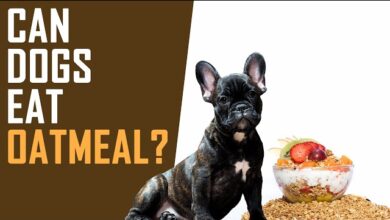
Granola is a popular breakfast food for people, known for its fiber, vitamins, and minerals. It can help with weight management, heart health, and blood sugar control. However, if you have a dog, you may wonder if it is safe to share granola with them. Can dogs eat granola?
The answer to whether dogs can eat granola is not simple. While granola can be healthy for people, it may contain ingredients that are unsafe for dogs. It is important to check the contents carefully before offering any to your pet.
Many types of granola contain ingredients that are toxic or harmful to dogs, such as chocolate, raisins, xylitol, and some nuts. Even small amounts of these can cause serious health problems. It is best to avoid giving your dog granola unless you are sure it does not contain any unsafe ingredients.
Knowing which foods are safe for dogs is an important part of caring for your pet. This guide explains the main health risks of giving granola to dogs and suggests safer alternatives to keep your dog healthy.
What is Granola?
Granola is a popular breakfast food made by baking rolled oats with ingredients such as nuts, seeds, dried fruit, and sweeteners. The result is a crunchy mixture that many people enjoy as part of their morning routine.
Many granola recipes include ingredients like almonds, walnuts, and sunflower seeds, as well as natural sweeteners like maple syrup or honey. These provide fiber, protein, and important nutrients. However, some store-bought granola can be high in added sugar and calories, so it is important to check the label if you are watching your diet.
Can Dogs Eat Granola?
Pet owners should exercise caution when feeding granola to dogs. While granola itself is not toxic, some of the ingredients commonly found in it can be harmful to dogs.
Raisins are a major concern because they are toxic to dogs. Chocolate chips, which are sometimes added to granola, can also be a concern. Artificial sweeteners such as xylitol can be life-threatening to dogs, even in small amounts. High levels of sugar and fat may cause stomach upset or lead to weight gain.
If you want to give your dog granola, choose a plain, homemade version made only with dog-safe ingredients such as plain oats and small amounts of unsalted nuts. Introduce any new food slowly and in small portions to see how your dog responds.
To avoid any potential health risks, consider offering your dog treats that are specifically made for dogs. These are formulated to be safe and enjoyable for your pet.
The Benefits of Granola for Dogs
Granola can be a tasty snack for your dog if you use safe ingredients and offer it in small amounts. Not all granola is safe for dogs, so it is important to know which types are best before sharing this treat with your pet.
Nutritional Value
The main ingredients in plain granola, like rolled oats and puffed brown rice, are safe for dogs and offer some nutritional benefits. These foods provide protein, carbohydrates, calcium, and potassium, so they can be a healthy addition to your dog’s diet if given once in a while. Oats are especially good because they contain B vitamins and omega-6 fatty acids, which help keep your dog’s skin and cells healthy.
Digestive Health
Granola is a good source of fiber for dogs. The soluble fiber in oats can help dogs with digestion and may help keep blood sugar levels steady. Fiber also supports regular bowel movements, which is helpful for dogs that need digestive support. Be sure to feed granola in moderation, since too much fiber can lead to diarrhea.
Energy and Coat Health
Granola gives dogs slow-release energy, which is good for active pets. Healthy fats in seeds like flaxseeds provide omega-3 and omega-6 fatty acids that help keep your dog’s coat shiny and skin healthy. Pumpkin seeds add vitamin E, which supports your dog’s immune system.
The 6 Amazing Health Risks of Granola for Dogs
Granola may seem like a safe snack to share with your dog, but it can actually be harmful. While plain granola in very small amounts is not toxic, most commercial granolas include ingredients that are unhealthy or even dangerous for dogs.
Risk #1 – Toxic Ingredient Poisoning
Chocolate toxicity: Theobromine and caffeine effects
Chocolate is one of the most dangerous ingredients commonly found in granola for dogs. Even small amounts of chocolate contain theobromine and caffeine, two compounds that dogs cannot process in the same way humans do. These toxic substances can cause severe gastrointestinal upset, including persistent vomiting and diarrhea. What makes chocolate poisoning particularly frightening is that it can lead to rapid heart rate, muscle tremors, seizures, severe dehydration, and, in worst-case scenarios, death. Dark chocolate poses an especially high risk due to its concentrated theobromine content, but even milk chocolate in granola can be dangerous for dogs.
Raisin poisoning: Kidney failure risk
Raisins are also highly toxic to dogs and are found in many granola mixes. Even a small amount can cause kidney failure in dogs of any size. Symptoms may start with loss of appetite, vomiting, diarrhea, lethargy, and weakness. In severe cases, kidney failure can develop quickly and requires immediate veterinary care.
Xylitol danger: Blood sugar crashes and liver damage.
Some sugar-free or reduced-sugar granolas contain xylitol, an artificial sweetener that is very dangerous for dogs. Xylitol can cause a rapid drop in blood sugar, leading to weakness, loss of coordination, seizures, and liver damage. Even small amounts can be life-threatening.
Macadamia nuts: Neurological symptoms
Macadamia nuts frequently appear in gourmet granola mixes and are highly toxic to dogs. These nuts can cause disturbing neurological symptoms that affect your dog’s ability to move and function normally. While the exact mechanism isn’t fully understood, macadamia nut poisoning can lead to weakness, tremors, and coordination problems that can be deeply concerning for pet owners to witness.
Risk #2 – Digestive System Overload
High fiber content causing diarrhea
Granola is naturally high in dietary fiber, which can overwhelm your dog’s digestive system. While dogs do need some fiber in their diet, too much can lead to uncomfortable gastrointestinal issues. The high fiber content in granola can cause loose stools, diarrhea, and general digestive upset, especially in dogs who aren’t used to consuming such fiber-rich foods. This is particularly problematic because dogs have different fiber requirements than humans, and what’s healthy for us can be too much for them.
Gastrointestinal upset from complex ingredients
The complex mixture of ingredients in granola creates a perfect storm for digestive problems in dogs. Many granolas contain nuts, seeds, dried fruits, and various additives that are difficult for dogs to digest properly. This combination can result in stomach pain, nausea, vomiting, and diarrhea as your dog’s system struggles to break down these unfamiliar and challenging ingredients. Digestive upset can be particularly severe in dogs with sensitive stomachs or those that rarely eat human food.
Choking hazards from crunchy textures
The crunchy, hard texture of granola pieces poses a real choking hazard for dogs, especially smaller breeds. These pieces can become lodged in your dog’s throat, creating breathing difficulties that require immediate intervention. Even if the pieces make it past the throat, they can potentially cause intestinal blockages as they move through your dog’s digestive tract. This risk is compounded by the fact that many dogs tend to gulp down treats quickly without properly chewing them first.
Risk #3 – Obesity and Weight Gain
High caloric density of granola
Granola is high in calories, so even a small amount can add a lot to your dog’s daily intake. The calories come from nuts, oils, and sweeteners. For dogs who need to manage their weight, even occasional granola treats can make it harder to stay on track.
Sugar content leading to weight issues
Commercial granolas are loaded with various forms of sugar, including maple syrup, honey, and added sweeteners. While these natural sweeteners might seem healthier, they still contribute significantly to calorie content and can lead to rapid weight gain in dogs. The high sugar content not only adds empty calories but can also trigger cravings for more sweet foods, creating a cycle that’s hard to break. Dogs who regularly consume high-sugar treats like granola are at much higher risk for developing obesity-related health problems.
Long-term metabolic problems
Consistently feeding high-calorie, high-sugar foods like granola can disrupt your dog’s metabolism over time. This metabolic disruption can make it increasingly difficult for dogs to maintain a healthy weight, even when they return to their regular diet. The long-term consequences include a slower metabolic rate, increased fat storage, and a higher risk of developing diabetes and other metabolic disorders. These changes can be particularly problematic in older dogs or those already predisposed to weight-related health issues.
Risk #4 – Blood Sugar Complications
Sugar spikes from sweeteners
The sweeteners in granola can cause quick increases in your dog’s blood sugar. This puts stress on the pancreas and can make it hard for dogs to keep their blood sugar stable. After eating sweet treats, dogs may feel tired or unwell as their blood sugar drops again.
Risk of diabetes development
Feeding your dog high-sugar foods like granola regularly can raise the risk of diabetes. Over time, the body may become less responsive to insulin. Dogs with diabetes need ongoing care, so it is important to prevent this condition through a proper diet.
Impact on insulin regulation
Even if your dog doesn’t develop full diabetes, regular granola consumption can still disrupt normal insulin function. This disruption can lead to unstable energy levels, increased hunger, and difficulty maintaining a healthy weight. The body’s insulin response can become less efficient over time, leading to a cascade of metabolic problems that impact overall health and well-being. Dogs with existing health conditions are particularly vulnerable to these insulin regulation problems.
Risk #5 – Sodium Poisoning
High salt content in commercial granolas
Many commercial granolas contain surprisingly high levels of sodium, which can be dangerous for dogs in several ways. The salt content in granola often comes from added seasonings, preservatives, and flavor enhancers that make the product more appealing to human taste buds. Dogs have much lower sodium requirements than humans, so what seems like a normal amount of salt to us can be excessive for them. This high sodium content becomes particularly problematic when dogs consume granola on a regular basis or in large quantities.
Dehydration risks
Excessive sodium intake from granola can quickly lead to dehydration in dogs. The high salt content draws water from your dog’s cells, leaving them desperately thirsty and unable to maintain proper hydration levels. You might notice your dog drinking water excessively or seeming unusually restless after consuming salty granola. This dehydration can be particularly dangerous in hot weather or for dogs who are already dealing with health issues that affect their fluid balance.
Potential for sodium ion poisoning
In severe cases, the high sodium content in granola can lead to sodium ion poisoning, a serious medical emergency. The symptoms of sodium poisoning include vomiting, diarrhea, lethargy, loss of coordination, muscle tremors, and, in extreme cases, seizures and coma. What makes sodium poisoning particularly dangerous is that it can cause brain swelling as the body tries to restore proper fluid balance. Dogs experiencing sodium poisoning require immediate veterinary intervention to prevent permanent neurological damage or death.
Risk #6 – Nutritional Imbalance
Displacement of balanced dog food
If your dog eats granola treats, they may eat less of their regular dog food. This can lead to missing out on important nutrients found in balanced dog food. Over time, this may cause deficiencies.
Lack of essential nutrients for dogs
Granola is not made to meet a dog’s nutritional needs. While it may have some healthy ingredients, it does not provide the right balance of nutrients for dogs. Eating too much granola can lead to deficiencies that affect your dog’s health.
10% treat rule violation
Veterinarians recommend that treats make up no more than 10% of your dog’s daily calories, with the rest coming from balanced dog food. Because granola is high in calories, it is easy to go over this limit, which can unbalance your dog’s nutrition and lead to health problems.
Warning Signs of Granola Poisoning in Dogs
Granola may look like a healthy snack, but it can be dangerous for dogs because of ingredients like chocolate, raisins, and artificial sweeteners. Knowing the warning signs can help keep your dog safe.
Immediate Symptoms
Your dog may show early warning signs within the first few hours after eating granola containing harmful ingredients.
- Vomiting – Often the first sign, especially if chocolate or raisins were consumed
- Diarrhea – Can occur with or without blood, indicating digestive distress.
- Lethargy – Your normally active dog becomes unusually tired or weak
- Loss of appetite – Refusing food or treats they normally enjoy
- Excessive thirst – Drinking more water than usual
Severe Symptoms
More serious signs typically develop 24-48 hours after ingestion and indicate potential organ damage.
- Kidney failure signs – Reduced or no urination, bad breath with ammonia smell
- Seizures – Uncontrolled shaking or convulsions
- Tremors – Muscle twitching or trembling
- Difficulty breathing – Labored or rapid breathing
- Weakness – Unable to stand or move normally
Emergency Indicators
These critical signs indicate that you should call your vet immediately – don’t wait.
- Repeated vomiting that won’t stop
- Collapse or loss of consciousness
- Rapid heartbeat or irregular breathing
- Signs of severe dehydration – pale gums, extreme weakness
Remember, time is crucial when dealing with potential poisoning. If your dog has eaten granola containing chocolate, raisins, or xylitol, contact your veterinarian or the Pet Poison Helpline at 855-764-7661 immediately, even before symptoms appear. Early treatment gives your dog the best chance of recovery and can prevent serious complications from developing.
Safe Ingredients vs. Dangerous Ingredients in Granola
Many pet owners wonder if it is safe to share granola with their dogs. While some granola ingredients are safe for dogs, others can be harmful and should be avoided.
Safe Ingredients for Dogs
Many basic granola ingredients are not harmful to dogs. Plain rolled oats and puffed brown rice, which are common in most granolas, are safe for dogs to eat. These grains offer protein, carbohydrates, calcium, and potassium, all of which can support your dog’s health.
Safe additions include:
- Pumpkin seeds and flaxseeds
- Dried apples and bananas
- Dried blueberries and mangoes
- Plain peanuts or peanut butter (in moderation)
Toxic Ingredients to Avoid
However, many commercial granolas include ingredients that are highly toxic to dogs. These substances can cause severe health issues and may even be fatal:
- Chocolate: Contains theobromine and caffeine, causing vomiting, tremors, and severe dehydration
- Raisins and grapes: Can cause acute kidney failure, even in tiny amounts
- Xylitol: This artificial sweetener causes rapid blood sugar crashes and liver damage
- Macadamia nuts: Toxic nuts that cause weakness, vomiting, and temporary paralysis
- Pecans: Another nut variety that’s harmful to dogs
Questionable Ingredients
Some granola ingredients are not toxic but can still cause health problems for your dog:
- High sugar content: Consuming honey, maple syrup, and added sugars can contribute to obesity and dental issues.
- Excessive salt Intake Can cause dehydration and, in severe cases, lead to salt poisoning.
- High-fat nuts: While not toxic, they can trigger pancreatitis
| Category | Ingredients | Risk Level |
| Safe | Plain oats, puffed brown rice, pumpkin seeds, flaxseeds, dried apples/bananas | Low |
| Toxic | Chocolate, raisins/grapes, xylitol, macadamia nuts, pecans | Extreme |
| Questionable | High sugar items, excessive salt, honey, maple syrup | Moderate |
The safest option is to prepare homemade granola for your dog using only safe ingredients. Treats should make up less than 10 percent of your dog’s daily caloric intake.
Healthy Alternatives to Granola for Dogs
Choosing safe and nutritious treats for your dog can be straightforward. While many granolas contain harmful ingredients such as chocolate, raisins, and artificial sweeteners, there are healthy alternatives available.
Homemade Dog Treats
3-Ingredient Recipes Using Oats
Preparing homemade treats is a reliable way to provide your dog with healthy snacks. Oats are a good base ingredient, as they supply fiber and support healthy digestion.
Basic Oat and Peanut Butter Treats:
- 1½ cups old-fashioned rolled oats
- ½ cup natural peanut butter (xylitol-free)
- 1 large ripe banana
Mash the banana and mix it with peanut butter, then gradually add oats until a dough forms. Roll out the dough, cut into shapes, and bake at 325°F for 30 minutes.
Applesauce Variation:
- 2 cups oat flour (ground oats)
- ⅔ cup unsweetened applesauce
- ½ cup peanut butter
Combine the ingredients, roll out the dough, cut into shapes, and bake for 30 minutes. Store the treats for up to five days at room temperature or up to two weeks in the refrigerator.
Commercial Dog-Safe Granola
Specially Formulated Options
Some companies produce granola specifically formulated for dogs, removing harmful ingredients but keeping the crunchy texture that many dogs enjoy.
K9 Granola Factory offers wheat-, corn-, and soy-free options, all made in the USA. Their functional treats include calming support varieties with passionflower and chamomile.
Yitto Paws Granola Bites provides organic, human-grade dog biscuits with 6 simple ingredients or fewer, containing no added sugar, salt, or artificial preservatives.
These commercial products help ensure ingredient safety and offer a granola-like treat for your dog.
Single-Ingredient Treats
Safer Snack Alternatives
Single-ingredient treats are a good choice for dogs with sensitive stomachs or food allergies, as they reduce the risk of exposure to multiple allergens.
Popular single-ingredient options include:
- Freeze-dried liver or beef
- Dehydrated sweet potato slices
- Bully sticks made from 100% beef muscle
- Freeze-dried chicken or turkey hearts
These treats offer nutrition without fillers, artificial flavors, or potentially harmful additives. They are also useful for training, as each piece contains only two to five calories.
Single-ingredient treats also make it easier to determine which foods your dog tolerates, allowing you to create a safe treat rotation.
Emergency Protocol
Remain calm and assess the situation right away. Remove any remaining granola from your dog’s reach and check their mouth for leftover pieces. You can encourage your dog to drop anything by offering a treat or toy. Do not attempt to induce vomiting unless directed by a veterinarian, as this can sometimes cause additional harm.
Contact your veterinarian or the ASPCA Animal Poison Control hotline (888-426-4435) immediately. Quick action is important, especially if the granola contains toxic ingredients such as chocolate, raisins, xylitol, or macadamia nuts. If you are unsure about the ingredients, it is best to be cautious and seek professional advice.
Information for Your Vet
Your veterinarian will need specific information to provide the best care for your dog. Collect the granola packaging or ingredient list, as this information is important for determining toxicity. Tell your veterinarian how much granola your dog ate, your dog’s weight, and when the incident happened.
Be prepared to describe any symptoms you have observed, such as vomiting, diarrhea, lethargy, difficulty breathing, or changes in behavior. Also inform your veterinarian if your dog has any existing health conditions or is taking medications, as these details can affect treatment decisions.
Treatment Expectations
Treatment will depend on the toxic ingredients present in the granola and the amount your dog consumed. If substances such as raisins or chocolate were involved, your dog may require immediate decontamination by a professional and administration of activated charcoal to limit absorption.
In many cases, hospitalization with intravenous fluids for up to 48 hours is necessary, especially if kidney-damaging ingredients such as raisins are involved. Your veterinarian will monitor your dog’s vital signs and kidney function with regular blood tests. For less severe cases involving only high-fat or high-sugar granola, treatment may focus on managing digestive upset with a bland diet and supportive care.
Conclusion
Can dogs eat granola? The answer is not straightforward. While some granola ingredients are safe for dogs, many commercial varieties contain components that can be dangerous to your pet’s health.
There are six main risks to be aware of: chocolate toxicity, raisin poisoning, xylitol sweetener risks, high sugar content leading to obesity and diabetes, excessive fat causing pancreatitis, and choking hazards from nuts and large pieces. These dangers show that not all granola is safe for dogs.
It is essential for pet owners to carefully read ingredient labels. Watch for hidden dangers such as chocolate chips, raisins, artificial sweeteners, and high sugar content. Even ingredients that appear harmless can be unsafe for your dog. Each dog has unique dietary needs and sensitivities. Before offering any new food, including granola, consult your veterinarian for guidance. Your veterinarian can help determine what is safe based on your dog’s health, age, and diet. Your dog’s safety and health should always be the top priority when choosing treats.
FAQ
Can dogs eat granola safely?
Dogs should not eat granola. Many granola mixes have sugar, raisins, chocolate, and nuts, which can be harmful. Even plain granola has too much sugar and fiber for dogs. It’s safer to stick to dog-friendly treats instead of granola.
Why is granola bad for dogs?
Granola is bad for dogs because it often contains harmful ingredients like raisins, chocolate, and nuts. Even without those, the sugar and fiber in granola can upset a dog’s stomach, cause diarrhea, or lead to long-term health problems like obesity.
What happens if my dog eats granola?
If your dog eats granola, they may get stomach pain, vomiting, or diarrhea. If the granola has raisins, chocolate, or nuts, it can be toxic and dangerous. Call your vet right away if your dog shows signs of illness after eating granola.
Is plain granola okay for dogs?
Plain granola without sugar, raisins, or chocolate is still not good for dogs. It’s high in carbs and fiber, which may upset their stomach. Even in small amounts, it has little nutritional value for dogs compared to healthy snacks like carrots or apples.
What are safer alternatives to granola for dogs?
Instead of granola, give your dog safe snacks like plain Cheerios, apple slices, carrots, blueberries, or dog biscuits. These options are healthier, lower in sugar, and easier to digest. Always check with your vet before adding new foods to your dog’s diet.



